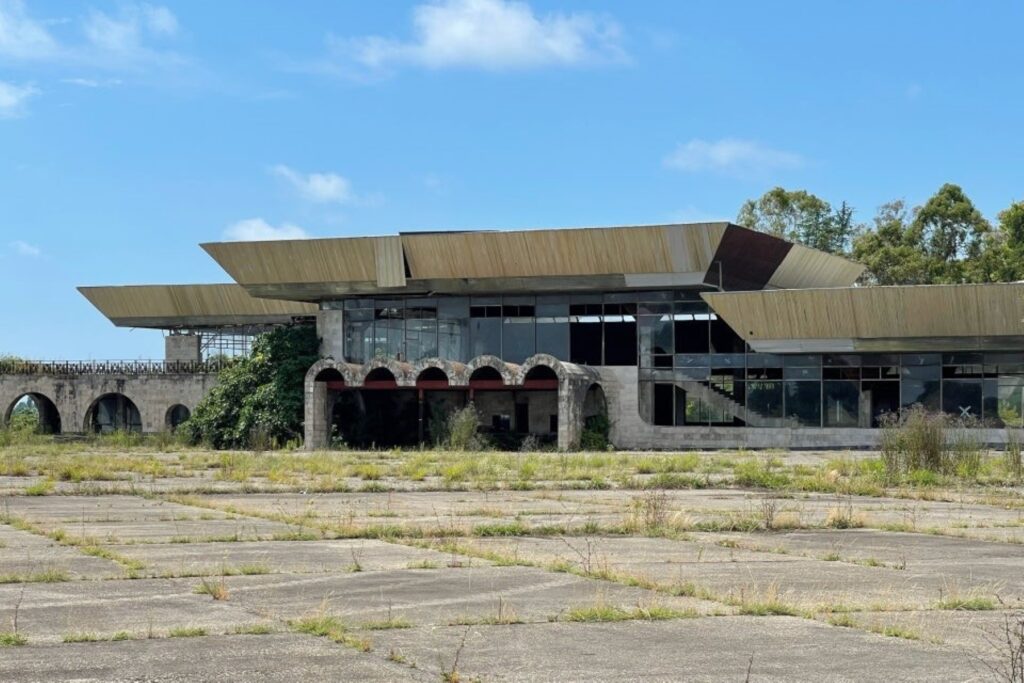Abkhazian MPs have voted to ratify an agreement between Russia and Abkhazia allowing a private Russian investor to fund the reconstruction of the Sukhumi (Sukhum) international airport.
The agreement was signed by Abkhazia’s Deputy Prime Minister and Minister of Economy, Kristina Ozgan, and the Head of Russia’s Ministry of Economic Development, Maxim Reshetnikov, at the Saint Petersburg Economic Forum in June. The agreement was developed by the Russian ministry with the aim of resuming air traffic with Abkhazia.
Critics have suggested that the investment will trap Abkhazia in debt to the Russian state, and could lead to a loss of sovereignty.
Wednesday’s vote saw 30 MPs voting to ratify the agreement, with two against and one abstaining.
Ozgan attempted to allay criticism in her address to parliament defending the agreement.
‘The investor will finance the restoration of infrastructure, but everything remains in state ownership’, said Ozgan.
The airport has been out of action since the 1992–1993 War in Abkhazia, with only helicopters and light aircraft using the airport’s runways since.
The agreement states that the restoration will be carried out in two stages, at the expense of an unnamed private investor, with no contribution from the state budget.
The cost of the first stage of reconstruction is estimated at approximately ₽6.5 billion ($72 million), and focused on the reconstruction of 2.4 kilometres of runway. The airport is expected to resume passenger flights in the fourth quarter of 2024.
The second stage of restoration is planned to begin after one million passengers are passing through the airport annually. Annual passenger traffic after the first stage of reconstruction is estimated to be around 400,000, with travel expected to take place between Russia and Abkhazia.
Critics of the project have also claimed that the promised deadlines and deliverables are unlikely to materialise, worrying that the project will only serve to worsen energy shortages and drag Abkhazia into debt to Russia.
One clause in the agreement states that in the case of electricity shortages, the airport will be a priority facility. Abkhazia faces frequent blackouts due to shortages.
Aiashara, a Telegram channel that reports news in Abkhazia, noted that Abkhazia would be liable to pay penalties to the Russian investor if it failed to fulfil its obligations, which include providing an uninterrupted supply of electricity to the airport and fixing the road leading to it.
Critics have also expressed concern that the investor has not been named. Abkhazia’s President Aslan Bzhaniya stated that the investor’s name was being kept hidden so as not to ‘jinx’ the deal, adding that he was alone in believing that the airport’s reconstruction would be successfully implemented.
Opposition politicians have repeatedly named Russian billionaire Oleg Deripaska as the prospective investor. Deripaska has been sanctioned by the West and faces criminal charges in the US.
Tengiz Jopua, a member of Abkhazia’s Civic Chamber, wrote on Facebook that the decision was comparable to selling a kidney to buy expensive sports shoes, ‘to put it mildly’.
‘I understand that this is stupid, but such is the logic of our government and society’, wrote Jopua. ‘The [worst] part is that you will have to work [tirelessly] for 50 years to pay off this loan. And this is with one kidney and other damaged organs.’
‘In the end: You may be asked by the bank for other organs due to your inability to pay off the loan in time, this is called debt restructuring. You will have your sports shoes and your kidneys taken away after you are declared bankrupt. You will die earlier because of kidney failure.’
‘Expensive sports shoes are of course cool, and it’s a shame that you didn’t have them for 30 years, but it’s very stupid to get them at such a price’, wrote Jopua.
Abkhazian economist Akhra Aristava expressed similar doubts about how fiscally realistic the decision would prove to be.
‘We cannot take on budgetary commitments to compensate for losses in investments to the sum of ₽10 billion ($110 million), if the state budget is less than ₽5 billion ($55 million)’, wrote Aristava. ‘What if something goes wrong? What if the Abkhazian side is to blame for something, for example if there’s no electricity, and we should pay ₽10 billion from the budget? But the money isn’t there. And, without reforms, it won’t be.’
He added that the agreement ran the risk that Abkhazia would have to ‘give up the entire airport […] to the Russian state’.
‘The Russian government […] know our capabilities, they understand precisely that even in three to five years we will not have the money to fulfil these obligations in the case of such a situation arising, and they still sign this agreement.’
‘Now there is only one way out: to sit down and think about how to triple the state budget as soon as possible — this is a matter of national security’, concluded Aristava.
Georgia’s President Salome Zurabishvili also took to Twitter to ‘condemn and protest the decision’, accusing Abkhazia of illegally transferring the ‘strategic location’ of the airport to Russia.
For ease of reading, we choose not to use qualifiers such as ‘de facto’, ‘unrecognised’, or ‘partially recognised’ when discussing institutions or political positions within Abkhazia, Nagorno-Karabakh, and South Ossetia. This does not imply a position on their status.




 28 July 2023
28 July 2023



